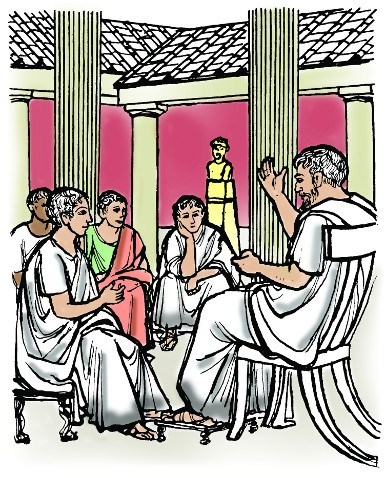About the Cambridge School Classics Project
CSCP is a research and development project established in 1966 with funding from the Nuffield Foundation and the Schools Council. Many Classics teachers and team members have been involved in the creation of our materials and the majority of UK teachers and students of Classics benefit from our work on a regular basis. Over 90% of secondary schools which offer Latin use our Cambridge Latin Course and our website receives over 100,000 visitors every week.
See below for more information on our:
Aims
The aim of the Cambridge School Classics Project (CSCP) is to help make the classical world accessible to as many students as possible - whatever their age or background - by
- forging strong links with teachers and learners
- advancing the pedagogy of Classics teaching through research and development
- creating high quality, innovative teaching materials based on research and development
- exploiting new technologies to reach out to new audiences and create cutting-edge materials
The Current Situation
CSCP is the only Nuffield project from the 1960s still running under its original constitution. Its role has expanded significantly since its inception though. With the CLC now firmly established and in its fourth edition in the UK (fifth in America), the CSCP's increased its support for Classics teachers by developing links with independent learners and by offering help to schools without Classics teachers. There have been new publications: graded tests for the first 3 Books of the CLC; independent learning manuals and answer books; worksheet masters to help teachers cater for as wide an ability span as possible, audio CDs and cutting edge online e-learning resource that can be licenced to individuals or multi-user sites. Go to The Shop for a full list of CLC materials available direct from the CSCP.
There have also been a number of new initiatives to support the teaching of Classics, including the provision of cross-curricular materials for primary and secondary schools (see for example Classic Tales) and further developments are underway. Another major step forward has been the introduction of the CLC into many American schools and the formation of a North American Cambridge Classics Project that provides support and in-service training for colleagues in Canada and the USA.
Background
CSCP was set up in 1966 under a joint initiative by the University of Cambridge Faculty of Classics and Department of Education and was generously funded by the Schools Council and the Nuffield Foundation to ensure that school Latin and Classics continued to flourish despite a number of challenges, including the removal of Latin as a matriculation requirement in Oxford and Cambridge.
Initial aims
The first CSCP Bulletin ("Towards a New Latin Reading Course") announced that the aim of CSCP was to:
- "develop materials and techniques which will accelerate and improve pupils' ability to read classical Latin literature and widen their knowledge of classical civilisation"
- "develop materials and courses for the non-linguistic study of Classics, with particular reference to widely varying levels of pupil ability."
Research
Starting from first principles and taking full account of teaching methodology in modern languages, CSCP developed a Latin course radically different from all previous courses. The newCambridge Latin Course (CLC) integrated the study of language and the ancient world by developing pupils' reading skills through a series of stories set firmly in the culture of the first century AD. At the same time as creating the Latin course the Project team worked on the production of non-linguistic materials in the hope of extending the range of pupils who had contact with and knowledge of the civilisations of Greece and Rome. These CSCP Foundation courses from the early 1970s played a significant part in the rise of Classical Civilisation (or Classical Studies, as it also called) as a school subject.
For a detailed early history of the work of CSCP see Modernising the Classics: a Study in Curriculum Development by Martin Forrest (University of Exeter Press, 1996).



 CSCP on Twitter
CSCP on Twitter